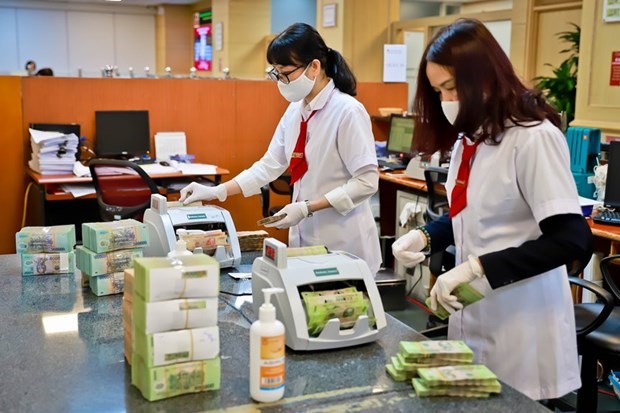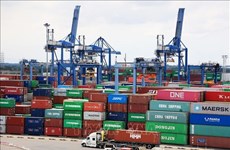Credit growth expected to recover in new normal
Deputy Governor of the State Bank of Vietnam Dao Minh Tu said that favourable conditions will be created to facilitate businesses’ access to loans, but credit quality still needs to be guaranteed and bad debt needs to be controlled in the short, medium, and long terms.
 Bank employees count money at a transaction office (Photo: VietnamPlus)
Bank employees count money at a transaction office (Photo: VietnamPlus)At present, since most provinces and cities nationwide have eased social distancing rules and enterprises have begun resuming operations, credit is hoped to post positive growth in the fourth quarter.
Breakthroughs expected
Recently, many commercial banks have been granted credit limit extensions by the State Bank of Vietnam (SBV), depending on their situation. Some even had their credit growth ceilings increased to over 17 percent. This will give them more room to provide loans for businesses to recover operations, especially in the peak credit season at the year-end.
Some banks have had credit growth limits raised by between 3.5 percent and 7 percent. Some examples of these raises are the Vietnam Technological and Commercial Joint Stock Bank (Techcombank) to 17.4 percent, Tien Phong Commercial Joint Stock Bank (TPBank) to 17.1 percent, and Vietnam Maritime Commercial Joint Stock Bank (MSB) to 16 percent.
Meanwhile, the Joint Stock Commercial Bank for Foreign Trade of Vietnam (Vietcombank) had this limit extended to 12.5 percent from 10.5 percent.
Deputy Director of Vietcombank Nguyen Thanh Tung said that his bank will prioritise the extended room granted by the SBV for enterprises hit hard by the pandemic so that they can boost production and business activities.
Insiders said the wider coverage of the COVID-19 vaccine has been enabling social restrictions to be gradually lifted. This is in turn promoting the restoration of businesses’ operations, consumer demand, and borrowing demand.
SBV Deputy Governor Dao Minh Tu said that if inflation stays stable, the central bank may extend credit growth ceilings further to help banks supply more capital for enterprises.
At a recent bank-to-business meeting, Deputy Director of the SBV Branch in Ho Chi Minh City Nguyen Hoang Minh noted that businesses’ demand for capital is forecast to grow strongly in year-end months. He said that local banks pledge to ensure sufficient capital supply to assist companies recover operations.
In Q4, HCM City will step up connecting credit institutions with enterprises. A credit package of about 70 trillion VND will help ease difficulties and challenges facing the business community, he added.
Tight control still needed
A company leader pointed out that businesses are currently in dire need of capital to resume operations, but their financial strength has been seriously eroded. Banks are still reluctant to provide the needed capital and some companies can get only short-term loans. There are several firms which lack collateral or export orders, making them ineligible for bank loans.
The biggest wish of businesses now is to gain access to credit, he said.
Some proposed that the banking sector lower credit eligibility criteria for a certain period of time to facilitate enterprises’ access to credit. For commercial banks to do this, the SBV needs to remove obstacles in terms of the capital adequacy ratio.
However, experts also recommended tightening control over the loans to be disbursed in the time ahead so as to prevent non-substantive credit growth.
Dau Anh Tuan, Director of the Legal Affairs Department at the Vietnam Chamber of Commerce and Industry (VCCI), held that a preferential credit policy is highly meaningful to enterprises. This is because the reduction of fees and interest rates, as well as the extension of debt repayment deadlines have helped reduce financial obligations on firms and boost funding for their operations.
Each bank is also an enterprise. Banks want to supply loans, but those debts must be collectable so that they can operate sustainably, he noted. He added that in order to steer the monetary policy, the central bank needs to concurrently promote business access to credit and ensure the safety of the entire banking system.
Regarding this issue, Deputy Governor Tu affirmed that the SBV will create conditions for more credit to be supplied if the economy needs it. However, in order to guarantee safety, the SBV isn’t considering lowering criteria for credit access./.













